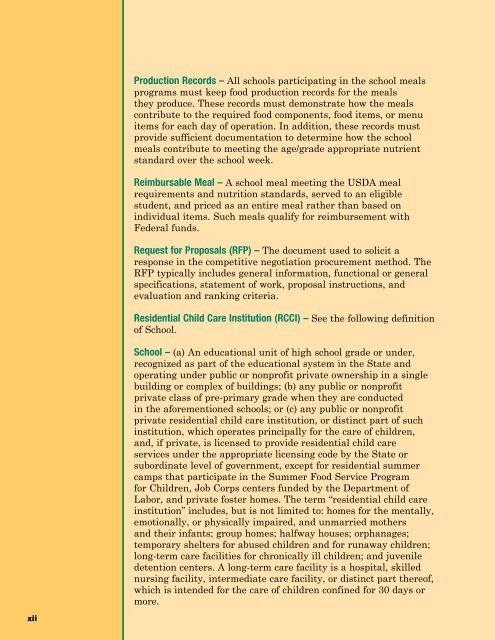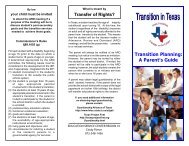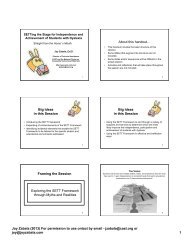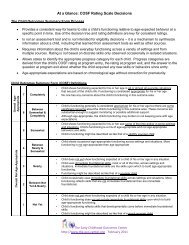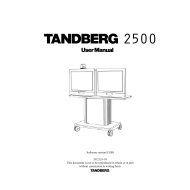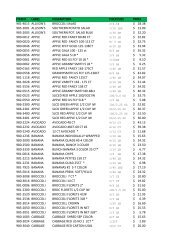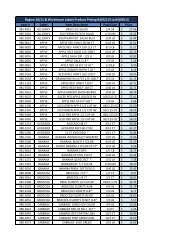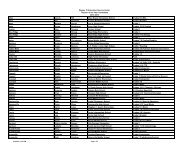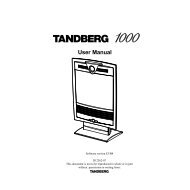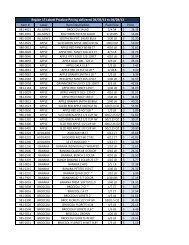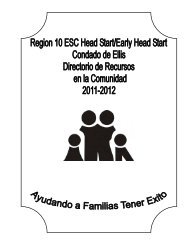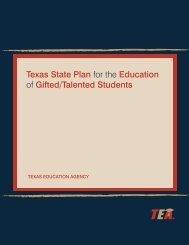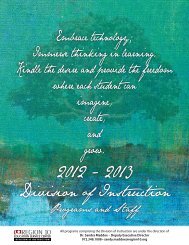Road to SMI Success Manual - Region 10 Education Service Center
Road to SMI Success Manual - Region 10 Education Service Center
Road to SMI Success Manual - Region 10 Education Service Center
Create successful ePaper yourself
Turn your PDF publications into a flip-book with our unique Google optimized e-Paper software.
Production Records – All schools participating in the school meals<br />
programs must keep food production records for the meals<br />
they produce. These records must demonstrate how the meals<br />
contribute <strong>to</strong> the required food components, food items, or menu<br />
items for each day of operation. In addition, these records must<br />
provide sufficient documentation <strong>to</strong> determine how the school<br />
meals contribute <strong>to</strong> meeting the age/grade appropriate nutrient<br />
standard over the school week.<br />
Reimbursable Meal – A school meal meeting the USDA meal<br />
requirements and nutrition standards, served <strong>to</strong> an eligible<br />
student, and priced as an entire meal rather than based on<br />
individual items. Such meals qualify for reimbursement with<br />
Federal funds.<br />
Request for Proposals (RFP) – The document used <strong>to</strong> solicit a<br />
response in the competitive negotiation procurement method. The<br />
RFP typically includes general information, functional or general<br />
specifications, statement of work, proposal instructions, and<br />
evaluation and ranking criteria.<br />
Residential Child Care Institution (RCCI) – See the following definition<br />
of School.<br />
School – (a) An educational unit of high school grade or under,<br />
recognized as part of the educational system in the State and<br />
operating under public or nonprofit private ownership in a single<br />
building or complex of buildings; (b) any public or nonprofit<br />
private class of pre-primary grade when they are conducted<br />
in the aforementioned schools; or (c) any public or nonprofit<br />
private residential child care institution, or distinct part of such<br />
institution, which operates principally for the care of children,<br />
and, if private, is licensed <strong>to</strong> provide residential child care<br />
services under the appropriate licensing code by the State or<br />
subordinate level of government, except for residential summer<br />
camps that participate in the Summer Food <strong>Service</strong> Program<br />
for Children, Job Corps centers funded by the Department of<br />
Labor, and private foster homes. The term “residential child care<br />
institution” includes, but is not limited <strong>to</strong>: homes for the mentally,<br />
emotionally, or physically impaired, and unmarried mothers<br />
and their infants; group homes; halfway houses; orphanages;<br />
temporary shelters for abused children and for runaway children;<br />
long-term care facilities for chronically ill children; and juvenile<br />
detention centers. A long-term care facility is a hospital, skilled<br />
nursing facility, intermediate care facility, or distinct part thereof,<br />
which is intended for the care of children confined for 30 days or<br />
more.<br />
xii


